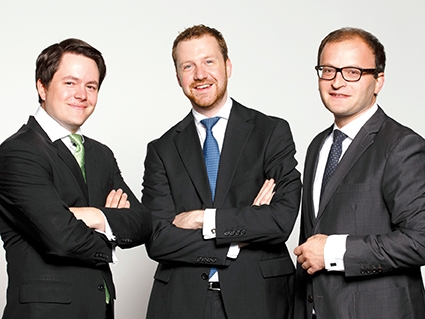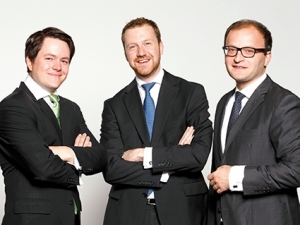Startup Grind Presents: Tamaz Giorgadze, ‘Raisin’
Exclusive Interview
The series on Startup Ecosystem in Georgia has been in the works for quite some time, with a motley crew of players in the field: the relevant government agencies working with/for the startups, like GITA and Enterprise Georgia; Startup Grind - the brainchild of Colin Donohue, whom I’d loosely brand “a facilitator” (he’s a CEO of the SG Tbilisi chapter); and TBC and BOG. With more installments of the series to follow, today, we present the star of the latest Startup Grind event that took place on March 23 at the Rooms Hotel in Tbilisi.
Tamaz Giorgadze, a founder and CEO of the German startup Raisin GmbH, sat down with us for a chat while the startup crowd networked in anticipation of the official event. A native of Kutaisi, western Georgia, Giorgadze has a trademark quick wit and a dry sense of humor, but none of the boastfulness or overinflated ego that is almost expected of a successful entrepreneur who raised $114 million in Series D funding, whose company operates in 30+ countries and who just bought a German MHB Bank (regulatory approval underway).
Giorgadze was a “wunderkind,” a child prodigy who graduated from high school at age 12 and was trained to become a future chess star (chess was hugely popular in Georgia, producing grandmasters and world champions aplenty, albeit on the female side). As a teenager, he moved to Tbilisi to study economics at the state university, graduated, had a brief gig as a Presidential Aide in foreign policy mentored by legendary Gela Charkviani, whose input Giorgadze appreciates to this day, but went abroad shortly thereafter. In Germany, he studied some more, earning a degree in Law and a PhD in Economics, and eventually ended up at McKinsey – a global management consulting firm that gave him exposure to retail banks across Europe and Asia. Giorgadze credits a decade spent at McKinsey for the many skills that proved useful later on: an ability to listen to clients/counterparties and identify their needs, patience in negotiating, and a genuine interest in finding mutually beneficial solutions. His advice for startup hopefuls: before founding something, get a proper job!
The recent TechCrunch article succinctly described Raisin as “the pan-European fintech marketplace for savings and investment products,, so that’s exactly where we started our conversation. Raisin has 69 partner banks, usually on a small-to-medium scale, that are ready to offer their clients more attractive interest rates on savings than the larger financial institutions – in total, over 250 products available at the click of a button. Raisin provides a platform connecting those banks, from Portugal to Poland, from the Czech Republic to Malta, to the customers they wouldn’t have been able to reach otherwise. The startup makes its income in the commission it charges the banks, for essentially allowing them to take full advantage of the EU-wide single financial market. This inevitably brings up the issue of Brexit.
Raisin offers products in the UK, both in GBP and EUR. Do you expect Brexit to have a negative impact on that part of your business?
Not on the GBP side, no. You see, the GBP-based offers are only from locally licensed banks, so no Brexit implications there. The EUR, however, will suffer– we will be offering the product elsewhere, but the UK entities, the three banks that worked on that, would have to stop after Brexit.
Do you plan to expand into other jurisdictions? Other continents, maybe?
We’re thinking of Asia as a probable next step in expansion. Clearly, there is an interest in the service we’re offering, since we know of several copycat businesses – in India, even in Australia, but those are country-wide, nothing cross-border – unlike Raisin. At the same time, we see plenty of opportunities within the EU, and are planning to explore them. Currently, EUR 11 bln has been invested via Raisin, platform-wide, and that’s a good number, but consider this: the whole savings product market in the European Union is over EUR 12 trillion! Lots of growth to tap into!
Do you see banks being eliminated by platforms like Raisin? What is the future of the traditional face-to-face banking?
I’m on the Board of the Bank of Georgia [note: through McKinsey exposure, unrelated to Raisin activities], and I have to say that the banks will survive! In reality, it’s a mutually beneficial relationship: fintech startups push banks to change, to improve their services, to diversify their products. Raisin relies on the banks not just for offering competitive interest rates on savings and deposits: all of our KYC is based on the existing banking relationships of our clients. Basically, when you open an account with Raisin online, it gets tied to the account you maintain at your traditional banking institution, so all the funds you transfer, both deposits and withdrawals, go through a regular bank that has verified who you are and where you got the money from. It’s a mandatory requirement for AML purposes: anti-money laundering regulations in the EU are very strict.
AML, KYC, risk appetite – all of these buzzwords seem to trigger regulators, and you have several of those, in different jurisdictions. What is your relationship with them?
This brings us to the beginnings of Raisin: the whole idea of certain places offering better interest rates on deposits, and people wanting to take advantage of those high rates. Through McKinsey, I was exposed to several jurisdictions like that, plus, as a Georgian myself, I knew of the deposit rates here – very attractive to Western customers. We took this idea to the regulators in Germany, they evaluated the risks and chose not to give us the green light to proceed with jurisdictions like Russia, Kazakhstan, Georgia. So, we, the original three founders of Raisin, had to go back to the drawing board. There was some back and forth with the investors we had lined up, some changes ensued, but, after several weeks of deliberations, we were ready to offer the regulators something that agreed with the risk appetite – theirs and ours. Despite our service being completely online, we carry very low risk. In fact, 60% of Raisin’s customers (natural persons, although we’re just rolling out the products for GmbH, in Germany only) come from AA-AAA-rated countries, like Sweden or France. There are some jurisdictions that allow non-face-to-face account opening, but in Germany, we do identification via Postal Banks or video-chat. In Spain, there are tools like reference transfer, address verification, ID upload. We keep track of beneficial ownerships, no funds from Russia or China, for example, so, yes, we’re trying to keep risks very low.
For most, this will sound outside the template: startups are usually high-risk propositions.
We found a mutual comfort zone with the regulators, and it worked out pretty well. Generally, I maintain that having an open communication with them is very important; we had to tweak our original proposal, but the underlying core idea was good – and that’s what successful startups are all about, and the team, obviously. I’m a believer in hiring senior, experienced people, but we take in those who grow with the company, too.
Is that of interest for you in Georgia: recruiting for a team? What are your expectations for the Startup Grind?
I don’t set expectations, I just wanted to see what’s out here while keeping an open mind. Bank of Georgia works with fintech startups, and I keep an eye on this sector, too. Startup Grind Tbilisi is developing, so I thought it would be interesting to meet the people, share my experiences, successful or not.
Looking at Raisin, clearly, you’ve been very successful!
I’ve made my fair share of mistakes: it took me a couple of investment errors to realize that you have to leave everything to the professionals. Just because you’re good at fintech, it doesn’t mean you’re automatically good at investing, even if you had a couple of good calls at some point.
Last question before you step in front of the startup hopefuls: where did the company get its name, ‘Raisin’? It’s pretty dry for such a “juicy” business!
We wanted an easy word that would catch on. Originally, “raisin” meant that we were raising (raisin’) interest rates for the deposits and savings, we were raising funds… But also, the word “raisin” in French means grapes (note: Eng. “raisin” is “raisin sec” in Fr.). I’m Georgian, so grape culture is in my blood. We weren’t thinking about it back in 2013, but, if we decide to sell the domain in France, we could make good money [laughs].
By Kyra Devdariani
Photo: The founders of Raisin, Tamaz Georgadze pictured on the right. Source: businessinsider.com.au











